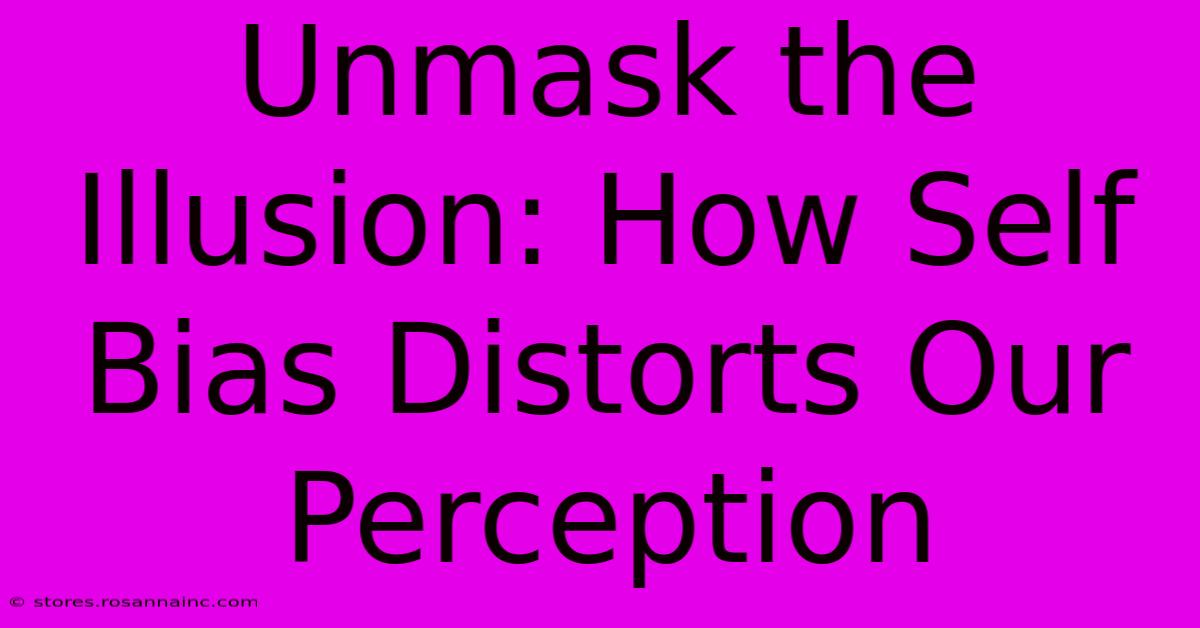Unmask The Illusion: How Self Bias Distorts Our Perception

Table of Contents
Unmask the Illusion: How Self-Bias Distorts Our Perception
We all like to think of ourselves as objective, rational beings. We believe we see the world as it is, making decisions based on unbiased facts and logic. But the truth is far more complex. Our perceptions are consistently shaped by a powerful force: self-bias. This article delves into the fascinating and often frustrating ways self-bias distorts our perception of ourselves, others, and the world around us. Understanding these biases is the crucial first step towards making more informed and rational choices.
What is Self-Bias?
Self-bias, also known as egocentric bias, is a cognitive bias where we tend to perceive ourselves in a more positive light than objective reality warrants. This isn't necessarily about conscious deception; it's a deeply ingrained psychological mechanism that subtly influences our thoughts, feelings, and behaviors. It manifests in numerous ways, often unconsciously, shaping our self-image, our judgments of others, and even our memories.
Key Types of Self-Bias:
-
Self-Serving Bias: This is perhaps the most common form. It's the tendency to attribute positive outcomes to our own abilities and efforts (internal attribution), while blaming external factors for negative outcomes (external attribution). For example, acing a test is attributed to your intelligence and hard work, while failing is blamed on a poorly written exam or a distracting classroom.
-
Optimism Bias: This involves overestimating the likelihood of positive events happening to us and underestimating the likelihood of negative events. While a healthy dose of optimism is beneficial, an excessive optimism bias can lead to poor risk assessment and unrealistic expectations.
-
Confirmation Bias: This is the tendency to seek out and interpret information that confirms our pre-existing beliefs and ignore information that contradicts them. This bias reinforces our self-image, even when faced with contradictory evidence.
-
Dunning-Kruger Effect: This fascinating bias describes the phenomenon where individuals with low competence in a particular area overestimate their abilities, while highly competent individuals tend to underestimate their abilities. This highlights the difficulty we have objectively assessing our own skills and knowledge.
-
Spotlight Effect: This is the tendency to overestimate how much others notice and judge our appearance, behavior, and flaws. We believe we're under a constant spotlight, leading to heightened self-consciousness and anxiety.
The Impact of Self-Bias on Our Lives
The consequences of unchecked self-bias can be significant, impacting various aspects of our lives:
-
Relationships: Self-serving biases can lead to conflicts in relationships, as individuals struggle to take responsibility for their actions. The spotlight effect can fuel social anxiety and hinder genuine connection.
-
Decision-Making: Optimism bias and confirmation bias can lead to poor decision-making, as we may fail to adequately consider risks and alternative perspectives.
-
Professional Life: The Dunning-Kruger effect can hinder professional growth, as individuals fail to recognize their limitations and seek opportunities for improvement. Self-serving bias can damage teamwork and collaboration.
-
Mental Health: Persistent self-bias can contribute to feelings of inadequacy, anxiety, and depression, as individuals struggle to reconcile their self-perception with reality.
How to Minimize the Effects of Self-Bias
While we can't eliminate self-bias entirely, we can learn to mitigate its influence:
-
Seek Diverse Perspectives: Actively solicit feedback from trusted sources and be open to hearing perspectives that challenge your own beliefs.
-
Practice Self-Reflection: Regularly engage in introspection to identify potential biases and their impact on your thoughts and actions. Journaling can be a helpful tool.
-
Embrace Constructive Criticism: View criticism not as a personal attack, but as an opportunity for growth and improvement.
-
Develop Self-Awareness: Pay attention to your thought patterns and emotional responses. Recognize when you might be exhibiting self-serving biases.
-
Challenge Your Assumptions: Actively question your own beliefs and assumptions. Are they based on solid evidence, or are they driven by biases?
By understanding the insidious nature of self-bias and actively working to counteract its effects, we can move towards a more objective and realistic perception of ourselves and the world around us. This journey towards self-awareness is an ongoing process, but the rewards – improved relationships, better decision-making, and enhanced personal well-being – are well worth the effort. The key is to unmask the illusion and embrace the reality of our inherent biases, paving the way for more authentic and fulfilling lives.

Thank you for visiting our website wich cover about Unmask The Illusion: How Self Bias Distorts Our Perception. We hope the information provided has been useful to you. Feel free to contact us if you have any questions or need further assistance. See you next time and dont miss to bookmark.
Featured Posts
-
Attention Nail Enthusiasts The 2024 Color Forecast That Will Transform Your Tips
Feb 04, 2025
-
Why The Ricoh Gr Iiix Hdf Is The Perfect Camera For Capturing Life In Motion
Feb 04, 2025
-
Flower Power On A Budget Discover The Magic Of Wholesale Prices
Feb 04, 2025
-
Adorn Yourself With Natures Crown Discover The Enchanting World Of Flower Crowns
Feb 04, 2025
-
Designers Reveal The Power Of American Gold In Contemporary Spaces
Feb 04, 2025
